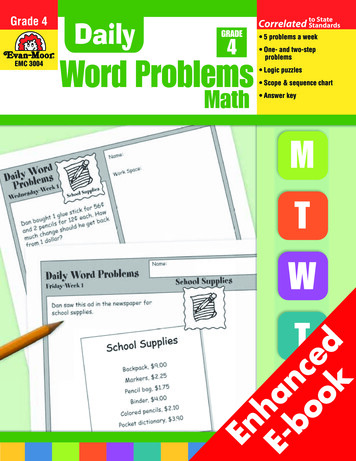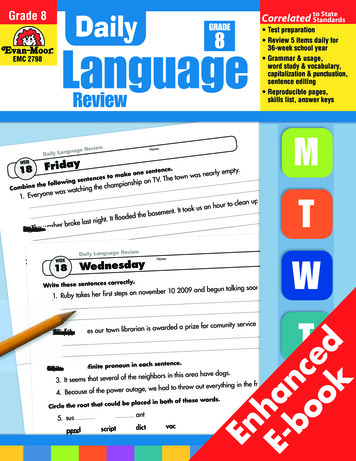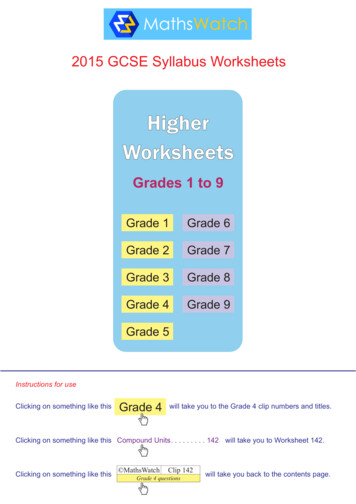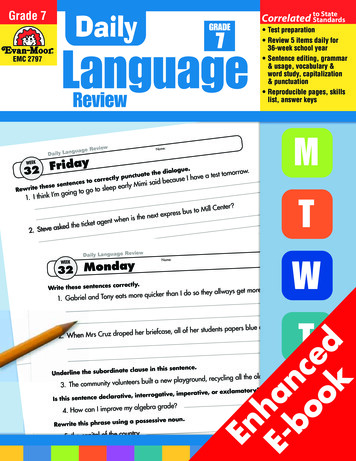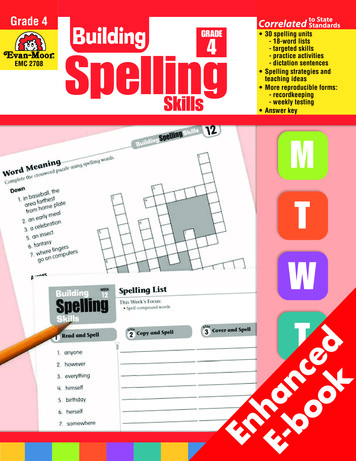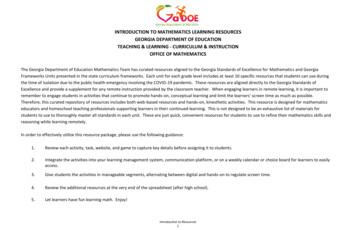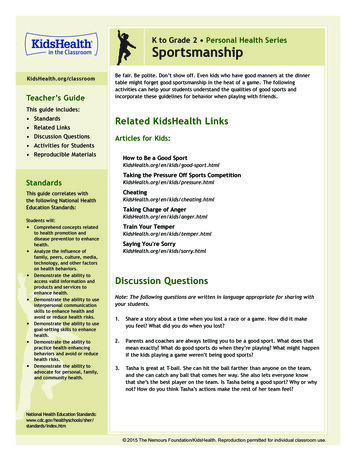
Transcription
K to Grade 2 Personal Health ’s GuideBe fair. Be polite. Don’t show off. Even kids who have good manners at the dinnertable might forget good sportsmanship in the heat of a game. The followingactivities can help your students understand the qualities of good sports andincorporate these guidelines for behavior when playing with friends.This guide includes: Standards Related Links Discussion Questions Activities for StudentsRelated KidsHealth LinksArticles for Kids: Reproducible MaterialsHow to Be a Good SportKidsHealth.org/en/kids/good-sport.htmlTaking the Pressure Off Sports e.htmlCheatingThis guide correlates withthe following National HealthEducation Standards:Students will: Comprehend concepts relatedto health promotion anddisease prevention to enhancehealth. Analyze the influence offamily, peers, culture, media,technology, and other factorson health behaviors. Demonstrate the ability toaccess valid information andproducts and services toenhance health. Demonstrate the ability to useinterpersonal communicationskills to enhance health andavoid or reduce health risks. Demonstrate the ability to usegoal-setting skills to enhancehealth. Demonstrate the ability topractice health-enhancingbehaviors and avoid or reducehealth risks. Demonstrate the ability toadvocate for personal, family,and community health.KidsHealth.org/en/kids/cheating.htmlTaking Charge of AngerKidsHealth.org/en/kids/anger.htmlTrain Your TemperKidsHealth.org/en/kids/temper.htmlSaying You're SorryKidsHealth.org/en/kids/sorry.htmlDiscussion QuestionsNote: The following questions are written in language appropriate for sharing withyour students.1.Share a story about a time when you lost a race or a game. How did it makeyou feel? What did you do when you lost?2.Parents and coaches are always telling you to be a good sport. What does thatmean exactly? What do good sports do when they’re playing? What might happenif the kids playing a game weren’t being good sports?3.Tasha is great at T-ball. She can hit the ball farther than anyone on the team,and she can catch any ball that comes her way. She also lets everyone knowthat she’s the best player on the team. Is Tasha being a good sport? Why or whynot? How do you think Tasha’s actions make the rest of her team feel?National Health Education s/index.htm 2015 The Nemours Foundation/KidsHealth. Reproduction permitted for individual classroom use.
K to Grade 2 Personal Health SeriesSportsmanshipActivities for StudentsNote: The following activities are written in language appropriate for sharing with your students.Good Sports CharadesObjectives:Students will: Determine the difference between good and poor sportsmanshipMaterials: "Good Sports Charades" handoutTwo paper bagsScissorsMarkersClass Time:45 minutesActivity:[Note to instructor: Prior to the activity, print the "Good Sports Charades" handout. Cut out each of the scenarios andplace them in one bag. Label this bag "Stories." Cut out the "Good Sport/Not a Good Sport" slips and place them inthe second bag. Label this bag "Actions."]Have you ever played charades before? When you play charades, one person acts out something and everyone elsetries to guess what he or she is acting out. When you play Good Sports Charades, someone performs an action andeveryone else tries to guess whether or not he or she is acting like a good sport! When it’s your turn to play GoodSports Charades, pull a slip of paper from the "Stories" bag. I will read the story out loud. Then pull a slip of paperfrom the "Actions" bag. This paper will tell you if you’re supposed to act like a good sport or a poor sport.("Good Sport" goes with a smiley face, "Not a Good Sport" goes with a frown.) If you get a "Good Sport" slip, act outhow a good sport would react to the sports story I read. If you get a "Not a Good Sport" slip, act out what a kid who’sbeing a poor sport does. Then your classmates will raise their hands to vote for whether you were acting like a goodsport or not.Extensions:1.It’s not too hard to act like a good sport when playing charades, but do you always act like a good sport on thebaseball diamond, soccer field, or basketball court? Think about how you act when playing games with yourfriends. How could you do a better job of being a good sport? Draw a picture of yourself doing a better job ofbeing a good sport, and remember your goal the next time you play a game with friends.2.It’s tough being a good sport all the time, especially when you lose a game. What could you say to a friend whojust lost a soccer game? With a friend, role-play a talk you might have with someone who’s upset about losing.Help your friend to see why it’s important to be a good sport. 2015 The Nemours Foundation/KidsHealth. Reproduction permitted for individual classroom use.
K to Grade 2 Personal Health SeriesSportsmanshipGood Sport AwardObjectives:Students will: Identify behaviors of good sportsmanshipMaterials: "Good Sport Award" handoutArt supplies (crayons, markers, colored pencils, etc.)Class Time:30 minutesActivity:Good sports are fair, polite, and fun to play with. You can thank good sports by presenting them with a Good SportAward. Before you create your award, think about how good sports play, win, and lose games. With your class, listways to be a good sport. Now you’re ready to design your award. Using the "Good Sport Award" handout, draw a pictureof someone playing a sport.Once you’ve finished your drawing, think about one person you know who should win your Good Sport Award. Itcould be a kid in your school, a coach, an athlete on TV, or a team member from your summer baseball league. Justpick someone who you think always acts like a good sport and deserves some credit. You can write his or her name onthe line provided on the trophy. Then we'll talk about the award winners we chose and why we chose them.Reproducible MaterialsHandout: Good Sports ortsmanship handout1.pdfHandout: Good Sport smanship handout2.pdfQuiz: onal/fitness/sportsmanship quiz.pdfAnswer Key: onal/fitness/sportsmanship quiz answers.pdfKidsHealth.org is devoted to providing the latest children’s health information. The site, which is widelyrecommended by educators, libraries, and school associations, has received the "Teachers’ Choice Awardfor the Family” and the prestigious Pirelli Award for "Best Educational Media for Students.” KidsHealthcomes from the nonprofit Nemours Foundation. Check out www.KidsHealth.org to see the latest additions! 2015 The Nemours Foundation/KidsHealth. Reproduction permitted for individual classroom use.
Personal Health SeriesSportsmanshipGood Sports CharadesInstructions: When you play Good Sports Charades, someone performs an action and everyone else tries to guess whether or notthe person is acting like a good sport. Pull a slip of paper from the "Stories” bag. I will read the story aloud. Then pull a slip ofpaper from the "Actions” bag. If you get a "Good Sport” slip, show how a good sport would react. If you get a "Not a Good Sport”slip, show what a kid who’s not being a good sport does. Then your class will raise their hands to vote for whether you wereacting like a good sport or not.[Note to instructor: Prior to the activity, print this handout. Cut out each of the scenarios and place them in one bag. Labelthe bag “Stories.” Cut out the “Good Sport/Not a Good Sport” slips and place them in the second bag. Label the bag "Actions."]Stories:Your soccer team needs one more goal to tie the game. Kendra dribbles the ball down thefield and kicks, but misses the goal. Your team loses. What do you do?Your team just lost a baseball game. Your friend, Chase, is on the winning team. He comesover to talk to you. What do you do?Your team just won a soccer game. Your friend, Molly, is on the losing team. She comes overto talk to you. What do you do?You’re playing a board game with your little brother. Your mom calls you into the kitchen fora minute. When you return, you notice that your brother has moved his game piece to a muchbetter position than where it was when you left. What do you do?You go to your friend Lucy’s house after school a lot. Lucy likes playing basketball in herdriveway. When you play, she always brags about how good she is and she keeps track of howmany baskets you miss. What do you do?You’re really good at basketball and score lots of points for your team. A new kid, Kevin,just joined the team. He’s never played basketball before and he isn’t too good yet. Thecoach asks you to sit out at the end of the game so Kevin can have a turn. What do you do? 2015 The Nemours Foundation/KidsHealth. Reproduction permitted for individual classroom use.
Personal Health SeriesSportsmanshipGood Sports CharadesActions:Good SportNot a Good SportGood SportNot a Good SportGood SportNot a Good SportGood SportNot a Good Sport 2015 The Nemours Foundation/KidsHealth. Reproduction permitted for individual classroom use.
Personal Health SeriesSportsmanshipName:Date:Good Sport AwardInstructions: Draw a picture of someone playing a sport, and write the name of the good sport on the trophy. 2015 The Nemours Foundation/KidsHealth. Reproduction permitted for individual classroom use.
Personal Health SeriesSportsmanshipName:Date:QuizInstructions: Answer each question.1.Kids who are polite, play fair, and handle losing well are called.a. sore losersb. braggersc. good sports2.Your team just lost the last soccer game of the season. What would a good sport do?a. Yell at your teammates for doing a bad job.b. Shake hands with the winners.c. Say mean things to the winning team.3.List three ways to be a good sport:a.b.c.4.You’re a very good basketball player and a good sport. What do you do when the coach asks you to sit out of the end of agame so another player can have a turn?a. Cry because you really want to score more points.b. Tell your teammates that you’re the best player on the team so you should be playing.c. Cheer for your team while you sit on the bench.5.Why is it important to be a good sport? 2015 The Nemours Foundation/KidsHealth. Reproduction permitted for individual classroom use.
Personal Health SeriesSportsmanshipQuiz Answer Key1.Kids who are polite, play fair, and handle losing well are calledgood sports.a. sore losersb. braggersc. good sports2.Your team just lost the last soccer game of the season. What would a good sport do?a. Yell at your teammates for doing a bad job.b. Shake hands with the winners.c. Say mean things to the winning team.3.List three ways to be a good sport:Any three of the following: Be polite to everyone you’re playing with and against; don’t show off; tell youropponents “good game!”; learn the rules of the game; listen to your coaches and follow their directions; don’targue with officials; don’t make up excuses or blame teammates if you lose; be willing to sit out so others can getin the game; play fair and don’t cheat; cheer for your teammates no matter what.4.You’re a very good basketball player and a good sport. What do you do when the coach asks you to sit out of the end of agame so another player can have a turn?a. Cry because you really want to score more points.b. Tell your teammates that you’re the best player on the team so you should be playing.c. Cheer for your team while you sit on the bench.5.Why is it important to be a good sport? Kids who are good sports become known as kids who are fun to play with. Kidsmight not be as eager to play with someone who gets angry all the time and won’t give other players a break. 2015 The Nemours Foundation/KidsHealth. Reproduction permitted for individual classroom use.
Good sports are fair, polite, and fun to play with. You can thank good sports by presenting them with a Good Sport Award. Before you create your award, think about how good sports play, win, and lose games. With your class, list ways to be a good sport. Now you're ready to design your award. Using the "Good Sport Award" handout, draw a picture
